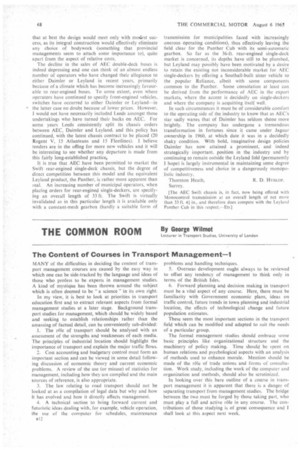THE COMMON ROOM
Page 70

If you've noticed an error in this article please click here to report it so we can fix it.
By George Wilmot
Lecturer In Transport Studies, University of London
The Content of Courses in Transport Management-1
MANY of the difficulties in deciding the content of transport management courses are caused by the easy way in which one can be side-tracked by the language and ideas of those who profess to be experts in management studies. A kind of mystique has been thrown around the subject which is often deemed to be "a science" in its own right.
In my view, it is best to look at priorities in transport education first and to extract relevant aspects from formal management studies at a later stage. Background transport studies for management, which should be widely based and seeking to establish relationships rather than the amassing of factual detail, can be conveniently sub-divided: I. The role of transport should be analysed with an assessment of the strengths and weaknesses of each media. The principles of industrial location should highlight the importance of transport and explain the major traffic flows.
2. Cost accounting and budgetary control must form an important section and can be viewed in some detail following discussion of economic theory and current economic problems. A review of the use (or misuse) of statistics for management, including how they are compiled and the main sources of reference, is also appropriate.
3. The law relating to road transport should not be looked at as a compilation of legal data but why and how it has evolved and how it directly affects management.
4. A technical section to bring forward current and futuristic ideas dealing with, for example, vehicle operation, the use of the computer for schedules, maintenance
a 1 2 problems and handling techniques.
5. Overseas development ought always to be reviewed to offset any tendency of management to think only in terms of the British Isles.
6. Forward planning and decision making in transport must be a vital aspect of any course. Here, there must be familiarity with Government economic plans, ideas on traffic control, future trends in town planning and industrial location, the effects of technological change and future population estimates.
These seem the most important sections in the transport field which can be modified and adapted to suit the needs of a particular group.
The formal management studies should embrace some basic principles like organizational structure and the machinery of policy making. Time should be spent on human relations and psychological aspects with an analysis of methods used to enhance morale. Mention should be made of the role of trade unions and forms of consultation. Work study, including the work of the computer and organization and methods, should also be scrutinized.
In looking over this bare outline of a course in transport management it is apparent that there is a danger of separating transport' from management studies. The bridge between the two must be forged by those taking part, who must play a full and active role in any course. The contributions of those studying is of great consequence and I shall look at this aspect next week.












































































































